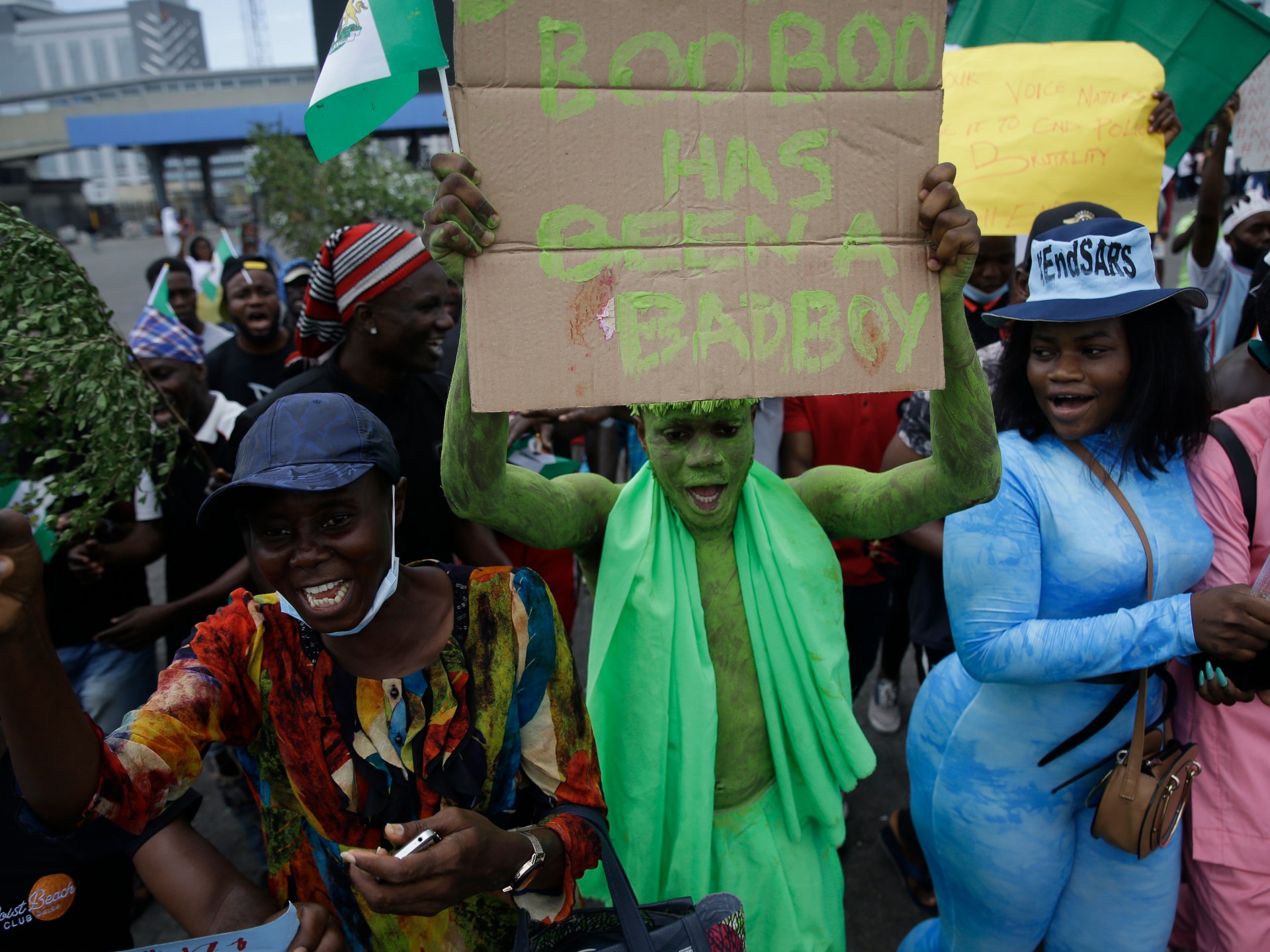[ad_1]
Lagos, Nigeria – For many years, Nigerians would dance on the streets to loud music on October 1, waving the nation’s flag in delight to rejoice its independence from the UK. On the 63rd anniversary of that second, the nation’s streets are bereft of the same old celebratory environment.
In Abuja, the capital, there have been usually banquets and live shows, typically backed by the federal government. However this time, as lately, the streets are quiet save for the movement of site visitors as churchgoers throng Sunday lots. Over the audio system, some clerics may be heard soliciting divine intervention to rescue Nigeria from the pits.
For Olive Chiemerie, a 23-year-old bookstore supervisor resident in Ikeja, Lagos, it’s pointless to rejoice. She was born simply as Nigeria returned to democracy in 1999 and used to take part in commemorative actions at college however has turn out to be disillusioned in maturity.
“Turning into an grownup in Nigeria beneath Buhari’s authorities makes it really feel like I’ve been robbed of my total future and I can’t do something however to look on hopelessly because the nation falls into disrepair,” Chiemerie instructed Al Jazeera.
Many youths share related sentiments.
Nigeria, a idiot at 63.
— Bella Hadidn’t (@SkinwithLolami) September 30, 2023
Africa’s largest economic system has lengthy been in free fall for the reason that Muhammadu Buhari administration, as youth unemployment, inflation, and debt are at an all-time excessive and proceed to climb. Greater than 60 % of the nation lives in what the United Nations calls “multidimensional poverty”.
Electrical energy remains to be abysmally poor; the nationwide grid has collapsed a number of occasions this 12 months and uninterrupted energy stays a fantasy. Buhari’s successor Bola Tinubu got here to workplace in a disputed election marred by allegations of vote-buying, voter intimidation, and collusion with establishments of state, by the opposition.
Early reforms, just like the removing of a gasoline subsidy and devaluation of the naira, had been carried out by Tinubu instantly after he took workplace in Could. They had been hailed by trade watchers as a welcome growth, however individuals say they’ve introduced them untold hardship.
Tinubu has scaled again a few of the reforms however nonetheless doubled down on the necessity to perform agonising reforms.
“Reform could also be painful, however it’s what greatness and the longer term require,” he mentioned in his Independence Day speech. “We now carry the prices of reaching a future Nigeria the place the abundance and fruits of the nation are pretty shared amongst all, not hoarded by a choose and grasping few.”
‘Transferring backwards’
When the Union Jack, the British flag, was lowered down and changed by Nigeria’s green-white-green one, Augustine Okofu was a 14-year-old schoolboy in Osisa in what’s at this time’s Delta state. A rally went on in his city for 3 days and he joined within the merriment.
Okofu went on to be such a believer in Nigeria that when battle broke out in July 1967, he fought for federal troops in opposition to the secessionist nation of Biafra.
He remembers rallying with the individuals of his township for days. However now, the day doesn’t maintain a lot that means to him.
“We had been very glad considering that Nigeria might be higher sooner or later. However as a substitute of issues to maintain getting higher, it’s getting darker. The individuals who suppose they’re clever are discovering the methods and method to vary every part,” mentioned Okofu, now 77.
These emotions of disenchantment from the totally different demographies that Chiemerie and Okofu belong to, stem from the idea that the nation must be much more developed, in accordance with Mark Amaza, spokesperson for Yiaga Africa, an Abuja-based civil society.
“If one of many guarantees of independence again in 1960 was for us to chart our personal course, that hasn’t panned out as a lot as we anticipated. Folks can’t see what excites them about independence if we’re nonetheless grappling with so many points and shifting backwards,” he mentioned.
And whereas patriotic pleasure has been on the decline lately, consultants say issues have deteriorated this 12 months. Past the state of the economic system, lingering ethnic tensions exacerbated by political variations over the last election cycle have contributed to the muted commemorations, they are saying.
Specialists say Nigerians have normally bonded collectively in occasions of financial increase and that translated to intervals of peak patriotism when the independence anniversary resonated with Nigerians.
Joachim MacEbong, a senior governance analyst at Lagos-based Stears Intelligence, factors to a few intervals particularly – the interval after independence in 1960 until the civil battle started in 1967; the Nineteen Seventies when there was a increase in crude oil revenues because the commodity displaced agriculture as Nigeria’s high export; and the primary stretch of the post-military period from 1999 to 2007.
“There was plenty of optimism within the nation and lots of people had been coming again to the nation from the diaspora taking a look at Nigeria as a spot of alternative,” he mentioned. “However each different time after that, we’ve got had that decline in optimism.”
Eroding affection
That decline is especially heightened this 12 months, particularly among the many youths whose buying energy has quickly decreased throughout their lifetime.
Within the Eighties, the naira was at par with the greenback. At present, $1 is roughly 1,000 naira.
A pissed off Chiemerie has now began plotting to Japa — a Yoruba phrase meaning to flee — as emigration overseas is colloquially referred to as.
“Each morning I get up, I’m despondent,” she instructed Al Jazeera. “I really feel like my life is caught in a spot and I don’t care what I’ve to do to get the cash to get out of right here … why ought to or not it’s the African dream to flee Africa with as a lot nationwide assets as we’ve got?”
Sentiments like Chiemerie’s must be a problem to authorities throughout all ranges, in accordance with Amaza. However most officers behave just like the proverbial ostrich with the pinnacle within the sand, hiding themselves and denying the apparent, he instructed Al Jazeera.
MacEbong agrees, saying the one means to enhance is for the federal government to start working for almost all versus only a choose few, to advertise inclusiveness.
“If the federal government continues to cater to the whims of just some individuals, that isn’t independence, that’s simply actually buying and selling one aspect of the shackle from colonialism to individuals who appear like us. If the federal government works, individuals will be capable of rejoice Independence Day the way in which they need to,” he mentioned.
In Lagos, Chiemerie has determined to spend the day visiting her aunt after church service.
“I’ll go on as if nothing is occurring within the nation,” she mentioned. “If anybody thinks I’m disloyal, Nigeria doesn’t care about me so I received’t exit of my technique to rejoice.”
[ad_2]


